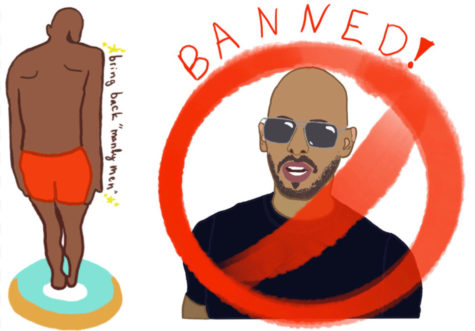Andrew Tate: Censorship conundrum
September 7, 2022

Andrew Tate was googled more than Donald Trump and Kim Kardashian this July. How did this once little-known influencer and former kickboxer attain immense popularity overnight?
Tate, who portrays himself as an authority on men’s self-help, appealed to his followers through the promise of sexual and financial success. His now-closed affiliate marketing program, Hustler’s University, allowed his subscribers to earn a commission for attracting new members. Tate instructed his subscribers to repost his most controversial content in order to kindle higher levels of engagement and, in turn, receive more referrals. The controversial nature of Tate’s content was most apparent in the misogynistic comments he made that ultimately drove him to fame this summer.
To say Tate is an advocate of traditional masculinity and gender roles would be an understatement. In 2017, Twitter banned Tate for saying rape victims should “bear responsibility” for their attacks. In a recent episode of Dave Portnoy’s BFFs podcast, Tate said women are “given to the man and belong to the man.” Tate, aged 35, has said he dates teenagers because it is easier to “make an imprint” on them, sentiments many have likened to grooming. Tate considers himself “absolutely a misogynist,” has compared women to dogs and has said that a woman’s role is to “have kids, sit at home, be quiet and make coffee.”
Apart from his commentary, American-born and British-raised Tate has also run into trouble with the law. Tate has several sexual assault allegations levied against him. In a YouTube video, Tate said that “40% of the reason” he moved from Britain to Romania was because it is easier to avoid legal repercussions for sexual assault there.
Nevertheless, Romanian police raided his home in April in concurrence with a human trafficking investigation and reports that an American woman was being held there against her will. Two women, an American and Romanian, were both found on Tate’s property during the raid.
A spokesperson from Women’s Aid in Britain denounced Tate’s behavior and called for social media platforms to do something, fearing the impact Tate’s content could have on young men and its potential to radicalize them. A widely circulated Instagram post from social justice advocate Matt Bernstein on Aug. 8 with over 80,000 comments also reiterated these concerns.
Mounting pressure on social media platforms to take action culminated in the ban of Tate from Instagram, Facebook, TikTok and YouTube in late August. A TikTok representative told the Washington Post that Tate was banned for violating community guidelines, citing policies against “content that attacks, threatens, incites violence against, or otherwise dehumanizes an individual or a group.”
In an interview with LadBible following his social media embargo, Tate claimed he was “playing a comedic character,” that “all of [his] posts were bible verses and charitable donations” and asked for social media platforms to give him his accounts back.
Social media influencer Jake Paul released Tate’s final message and said that while he does not support Tate’s views, he does support freedom of speech. However, Evan Santiago of the Charlotte Observer outlined the nuances of the First Amendment in regards to Tate’s censorship.
“The First Amendment protects the freedom of speech as it pertains to government-sanctioned censorship,” Santiago said. “Social media platforms are private companies that require users, Tate included, to agree to their terms of service before creating an account.”
Joe Rogan defended Tate’s “pro-male” and “pro-accountability” messages but conceded that the “misogynistic stuff” ruined his platform.
Tate has since moved to the “rights management video platform,” Rumble, whose activity has increased by 45% since his arrival. However, social media expert Matt Navarra says the size of Tate’s audience on Rumble is incomparable to the one he once reaped the benefits of on platforms like TikTok, Instagram and Facebook. Without his former audience, it seems as though Andrew Tate’s influence will be gone as quickly as it appeared.






















Leave a Comment